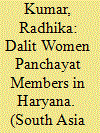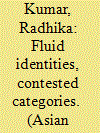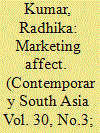|
|
|
Sort Order |
|
|
|
Items / Page
|
|
|
|
|
|
|
| Srl | Item |
| 1 |
ID:
178426


|
|
|
|
|
| Summary/Abstract |
Drawing on the latest round of elections to Panchayati Raj Institutions in the state of Haryana in 2016, this article interrogates the substantial increase in the number of Dalit women representatives, based on fieldwork in a specific village. Since both Dalit and non-Dalit women present narratives of non-participation in the functioning of the village panchayat, it is argued that the increase in Dalit women representatives was not by design, but by default, due to an amendment of the Haryana Panchayati Raj Act 2015. Overall, in the studied village, women continue to remain marginalised in the local representative bodies, and gender-based quotas have only ensured numerical visibility of women.
|
|
|
|
|
|
|
|
|
|
|
|
|
|
|
|
| 2 |
ID:
187160


|
|
|
|
|
| Summary/Abstract |
The most recent demand for reservation quotas in India has come from the regionally dominant castes of the Jats and Patidars in the arena of education and employment. However, given their status as ‘dominant’ castes, it is paradoxical that these castes are claiming a ‘backward’ status. This demand raises questions of two kinds. Firstly, what is the nature of caste identity that they wish to leverage for purposes of gaining access to state quotas? Secondly, what are the different ways in which identities, expectations and mobilisations are shaped by electoral politics? The paper argues that ethnic identities are fluid which take on newer features and markers as they interact with categories of recognition that the state establishes. These negotiations have been exacerbated by electoral politics and the policy of economic liberalisation which have together upset dominant caste equations.
|
|
|
|
|
|
|
|
|
|
|
|
|
|
|
|
| 3 |
ID:
186301


|
|
|
|
|
| Summary/Abstract |
Electoral campaigning in India is now effectively multi-modal and inhabits both the virtual and the real sphere. However, tools and techniques of campaigning vary across parties. The two parties that this paper focuses on, the BJP and the AAP, are known for running highly organized campaigns marked by their intensity and voter reach. The paper looks at the specific case of the Delhi assembly elections of 2015 and 2020 to compare strategies and the election campaign of the two parties. The paper argues that while the campaign of both parties was methodical and micro-managed, the selection of electoral issues and customization of the campaign to the addressed audience varied. The parties are comparable in terms of being leader centric, tending towards the personalization of politics, and both conducted professionalized campaigns, yet the political marketing of the element of affect differed. To demonstrate this, the paper firstly draws on literature in the field of political communication to illustrate the role of emotions, or the aspect of affect, in an electoral campaign. Secondly, through a perusal of media reportage and analysis, the paper traces the process by which personalization was manifested and how the narrative of affect came to be framed in the election campaign.
|
|
|
|
|
|
|
|
|
|
|
|
|
|
|
|
|
|
|
|
|